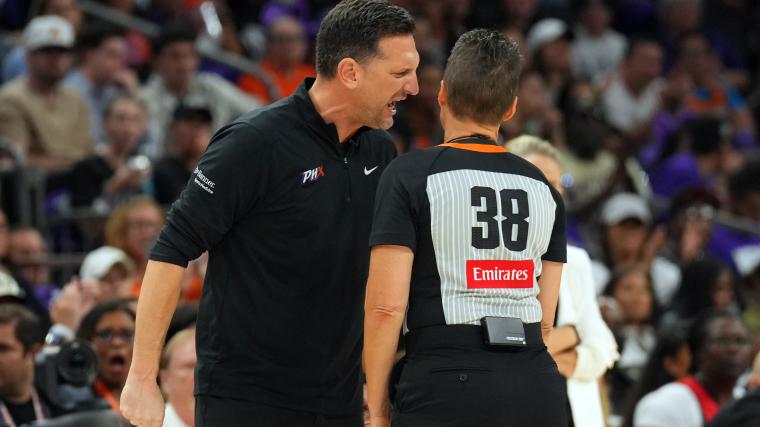The WNBA’s refereeing crisis might have one simple solution originally appeared on The Sporting News. Add The Sporting News as a Preferred Source by clicking here.
The WNBA and the Women’s National Basketball Players’ Association have numerous issues to work through as they try to thrash out a new collective bargaining agreement before the current one expires on Oct. 31. Raising the standard of WNBA officiating ranks toward the top of the list.
Advertisement
Refereeing controversies dominated the WNBA postseason, which rankled players, coaches and executives alike — including commissioner Cathy Engelbert, who revealed before Game 1 of the WNBA Finals that the league would be setting up an officiating “task force” to implement improvements in the coming seasons.
That’s because the playoffs in particular were dominated by physical play. In Game 3 of the semifinals between the Minnesota Lynx and the Phoenix Mercury, a firestorm erupted after a collision between Phoenix’s Alyssa Thomas and Minnesota’s Napheesa Collier resulted in the latter sustaining a season-ending leg injury. Lynx head coach Cheryl Reeve was suspended for Game 4 and levied a historic fine for ripping into the referees over the incident.
The other semifinal between the Indiana Fever and the Las Vegas Aces was defined by its rough physicality and officiating inconsistencies that upset both Indiana’s Stephanie White and Las Vegas’ Becky Hammon. Those two coaches also received fines from the WNBA for expressing solidarity with Reeve over the Collier incident and how officials treated it.
And during the finals, Mercury head coach Nate Tibbetts was ejected from the deciding Game 4 over what he called “one of the weakest double technicals ever.” Four technical fouls were issued in the second half of the season’s final game — making an already-bad look for the league even worse.
Advertisement
Per Front Office Sports, the new refereeing task force will be formalized during the league’s competition meetings next month. But according to Sue Blauch, the WNBA’s associate VP of referee performance and development, the league has to be ready to hire more people, and cannot be satisfied simply with the new task force or an NBA-style last two minutes report.
“From our perspective, we don’t have any issues owning up to our work,” Blauch told FOS. “Whether that’s excellent work or a mistake that was made in a game. There’s no objection on our part in any way, shape, or form to an L2M. The league would need to invest and say this is a priority and this is where we want to spend the resources that we have.”
WNBA referees are unsalaried contractors who are paid between $1,500 and $2,500 per game; their NBA counterparts take in up to $550,000 per season. Their training takes place through two refereeing camps, and their first practical experience takes place in the G League.
Advertisement
In addition to increasing referee salaries — scoring a win for officials as the players’ union attempts to secure their own historic financial gains — Blauch thinks that adopting NBA practices like an L2M would require 8-10 hours of work per day.
This work would not appear out of thin air. The WNBA, a league that is hauling in $250 million expansion fees for its newest teams, would have to target new employees and make a coordinated effort to grow in this department, just as the number of clubs and the number of zeroes affixed to player salaries will grow.
